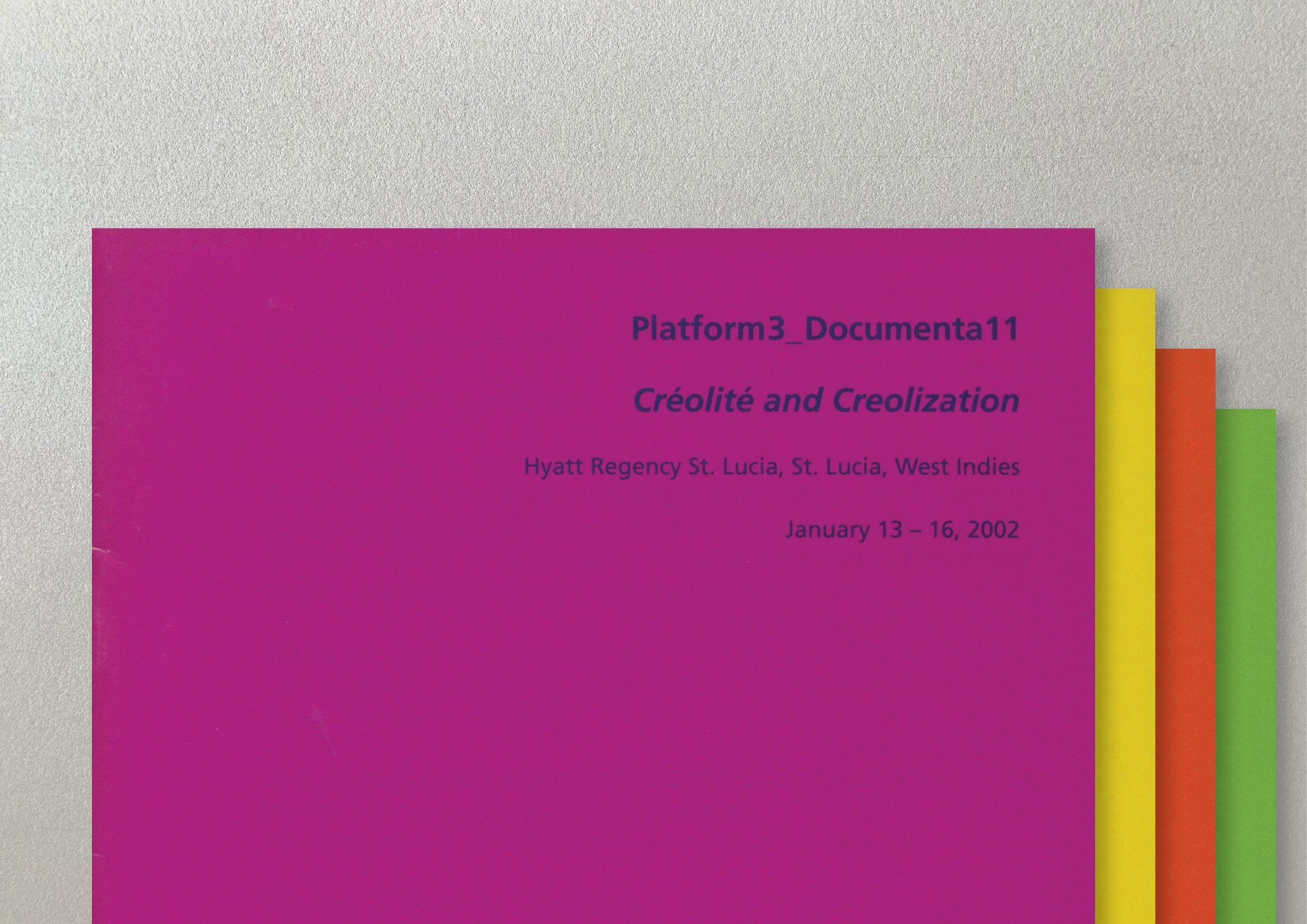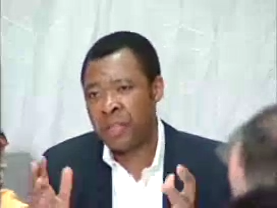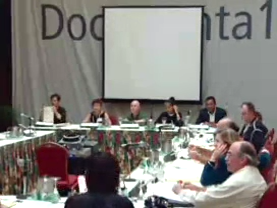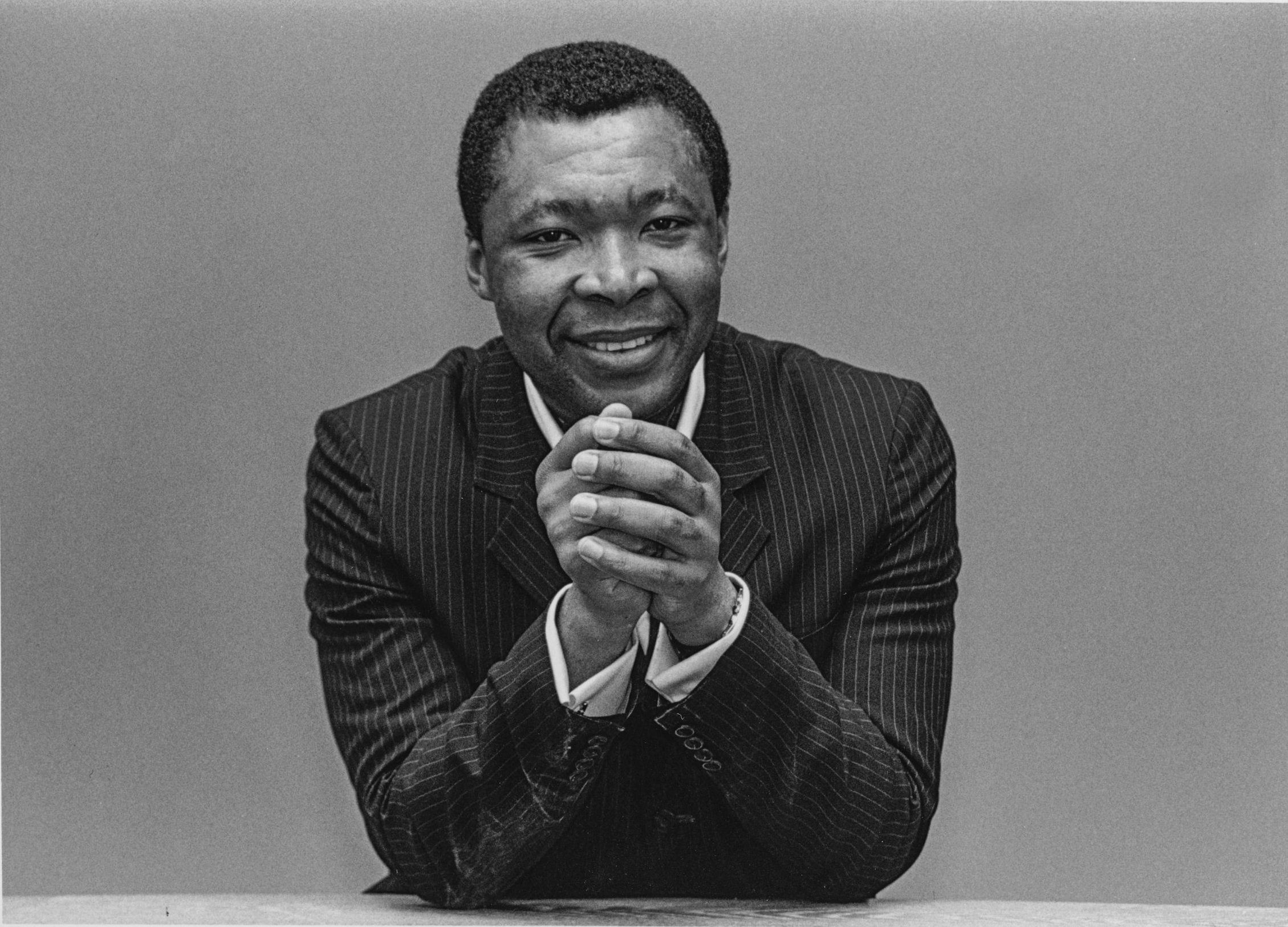Chapters
Platform3 Créolité and Creolization

© documenta archiv
"Le monde entier se créolise."
Edouard Glissant (1990)
[The world is in the process of creolization]
"The world is evolving into a state of Creoleness."
Bernabé Chamoiseau, Confiant (1989)
Introduction
In recent years, the increased and accelerated processes of cultural mixing around the world have produced new configurations of identity. Flows of images and cultural symbols have occurred across a geographical space reconfigured and differentiated along specific pathways. Rapid, unceasing, and often violent cultural encounters have created a context of uncertainty and unpredictability in which old symmetries are irrelevant. The notions of hybrid ity, métissage, and cosmopolitanism have been deployed and reworked in order to capture the polycentric and polysemic aspects of these new configurations. While still relevant, the notions of hybridity and metissage, under pressure from local resistance, no longer seem adequate as vectors through which to understand and articulate the critical issues of difference and the asymmetry of contemporary culture today.
In the French Caribbean, a new concept emerged: Créolité, Creoleness. Working from a tradition that has long sought to analyze the "chaos" produced by history in the Caribbean basin, three Martinican intellectuals, Jean Bernabé, Patrick Chamoiseau, and Raphaël Confiant, published in 1989 the founding text of Creoleness: Éloge de la Créolité (translated in 1990 as In Praise of Creoleness). Drawing from the works of Aimé Césaire and Edouard Glissant, Bernabé, Chamoiseau, and Confiant sought to elaborate an ethics of vigilance, a "sort of mental envelope in the middle of which our world will be built in full consciousness of the outer world". Neither Césaire nor Glissant had fully created the conditions for expressing the reality of the Caribbean, its open mosaic. Césaire's
Négritude was a "baptism, the primal act of restored dignity" and Caribbeanness "more a matter of vision than a concept". The notion of Creoleness expressed the "kaleidoscopic totality", the "non-totalitarian consciousness of a preserved diversity". The critical gesture and expression of this diversity is at the heart of the radical discourse of Créolité, especially as it concerns the question of what it means to live and work from the polycentrism of the Caribbean. From this emergent debate, fanned by the situational cultural compartimentalization of the region, it seems important today to operate a new reading of Creoleness. Can the concept be applied to describe each process of mixing, or is it peculiar to the French Caribbean? Does it truly constitute an alternative to the entrenched paradigms that have dominated the study of postcolonial and postimperial identities? What are the differences between Creolization and Creoleness? Is Creoleness a useful notion for the reading of cultural discourse? What are the relations between Creoleness and hybridity, Creoleness and miscegenation, Creoleness and cosmopolitanism? Can the "ethics of vigilance", that emerges out of Creoleness, be transformed into a political philosophy of the Other?
We wish to explore these questions during this conference in St. Lucia, that brings together linguists, literary and cultural theorists, philosophers, writers, and artists to whom the notion of Creoleness is a challenging one. Because of the manifesto of Bernabé, Confiant, and Chamoiseau, we believe that the island of St. Lucia constitutes a perfect site for the conference. The island is the matrix from which the writing of the values and of the advocacy of Creoleness has historically emerged. It is a contested terrain in which issues of language, identity, religion, and culture are debated along a "maelstrom of signifieds". We propose three main themes: Créolité and Creolization; Modernity, Urban Culture, and Creoleness; Language and Creoleness.

© documenta archiv / Video: documenta und Museum Fridericianum Veranstaltungs-GmbH
Créolité and Creolization
To the cultural critics of the French Antilles, Creoleness and Creolization are two distinct notions. Glissant favors creolization over creoleness because, he argued, creolization refers to an ongoing process. Creolization, Glissant says, always leads to unknown consequences. They are impossible
to foresee. There is a productive experience of the unknown, which we must not fear. Talking of this experience, Glissant harks back to the Plantation, a "gouffre-matrice", one of the "wombs of the world". Today's world is experiencing again the chaos of the Plantation. Glissant elaborates a theory of creative disorder that transcends the battle lines of center and periphery, North and South, dependency and independence. He reevaluates old terms such as Baroque, opacité, and nomadisme in order to describe the sense of global flux and fragmentation that the current state of the world creates. Chaos is thus a salutary state. To Bernabé, Chamoiseau, and Confiant, the processes of Creolization refer to the brutal interaction of culturally different populations as they have occurred in different parts of the world, in which the system of plantation organized the society. Creoleness, on the other hand, is the "fact of belonging to an original human entity which comes out of these processes in due time". In other words, the three Martinican writers see Creoleness as a process, an ethics that go beyond the process of Creolization, that emerges out of Creolization.
Glissant seems to insist on the strategy of opacité / alterité in human relationships, whereas Bernabé, Chamoiseau, and Confiant wish to focus on a state of being. In both instances, purity, monolinguism, false universality are attacked and criticized, contact and diversity celebrated. Yet, it appears that the strategies elaborated to attack and criticize a strategy of mono-identification differ. Glissant favors the notions of errance, métissage, and rhizome; Bernabé, Chamoiseau, and Confiant the notions of
desire and exchange.
It seems useful to further the understanding of the processes of Creoleness and Creolization in the fields of linguistics, literature, and social and religious performances. Scholars will be invited to present original work on these processes. The feminist critique of Creoleness will be included
in these contributions.
Modernity, Urban Culture, Creoleness, and Creolization

© documenta archiv / Video: documenta und Museum Fridericianum Veranstaltungs-GmbH
How and where are the texts of creoleness written and played out in the everyday? One of the salutary elements of creoleness is its inversive logic, that is, its ability to invert and convert the logic of the hegemonic sphere into the symbolic capital of cultural difference. Working in the gap where old-fashioned and outmoded notions of center and periphery, authenticity and otherness no longer work as stable forces in the cultural field, we explore the urban sites of Creoleness and Creolization. Rather than focus on the plantation, the countryside, the rural, we engage the consequences of the emergence of creoleness in the modern city. Increased and widespread urbanization in territories, which, until recently, were dominated by rural societies, has raised new questions. Cities in Africa, Asia, the Caribbean, the Indian Ocean constitute a mosaic of fragmented spaces differentially articulated as a result of national, regional, and global forces. New typographies have emerged. Cities are today's sites of creolization. New diasporic formations have reconfigured the urban space. Markets, dance halls, bars, and restaurants constitute spaces in which the strategies of creolization are played, deployed, and reworked. Is every post-modern city a site of Creolization?
Language and Creoleness
Until now, there has been no comprehensive catalogue of Creole arts and cultures. What would be its criteria? How would they be organized? By regions? By themes? By periods? How are the new typographies inscribed in language? How are the processes of Creoleness and Creolization expressed in literature and other linguistic practices? If Creoleness and Creolization seek to express the multiplicity, the polycentricity, and the diversity of cultural encounters that are never fixed but constantly reworked and reconfigured, how have writers and linguists met the challenge? How are Creoleness and Creolization translated into cultural productions? What constitutes a creolized "translation"? Trans-national, trans-urban, trans-diasporic, trans-cultural practices are
deeply transforming the ways in which we understand the world. The notions of Creoleness and Creolization offer a strategy of reading the configurations that are emerging today. The conference will contribute to the understanding of emerging processes and further the debate around the notions of Creoleness and Creolization. It will bring together scholars, writers, and artists in a conversation. It will constitute an exercise in Creoleness and Creolization through the experience of multilinguism, cultural diversity, and contact.
Contributors of Platform3:
Petrine Archer-Straw, Ute Meta Bauer, Jean Bernabé, Robert Chaudenson, Okwui Enwezor, Juan Flores, Stuart Hall, Isaac Julien, Dame Pearlette Louisy, Sarat Maharaj, J. C. C. Marimoutou, Gerardo Mosquera, Mark Nash, Annie Paul, Virginia Pérez-Ratton, Ginette Ramassamy, Irit Rogoff, Charity Scribner, Françoise Vergès and Derek Walcott.
Documenta11 Brochure
Platform3: Créolité and Creolization.
Concept
Okwui Enwezor
Project Adviser
Françoise Vergès
Research
Françoise Vergès, Mark Nash, Nadja Rottner
Editors
Barbara Clausen, Markus Müller, Christian Rattemeyer
Design
atelier groteske
Print date: 04/02
Signature: docA, AA, d11, File 101, fol. 3
